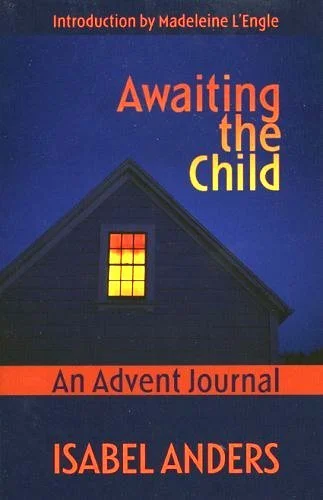Guest Writer Isabel Anders
Anders: Advent, Awaiting the Child
“Isabel Anders wrote these Advent meditations while waiting for her first baby to be born. I read them in my husband’s hospital room, watching him die. Now another Advent approaches, another time when birth and death draw close together, and it is not always possible to tell which is which.
As we move into Advent, we are called to listen, something we seldom take time to do in this frenetic world of over-activity. But waiting for birth, waiting for death—these are listening times when the normal distractions of life have lost their power to take us away from God’s call to center in Christ.”—Madeleine L’Engle.
John the Baptist represents the call to radical preparation of one’s whole life for the coming of the kingdom. His is an extreme message, and his story ends with an early death. Yet while he lived, he praised the Lord with his whole being, his habits, his reputation, his life—for all it was worth. He brought the messages of the Old Testament prophets, like Isaiah, into focus and validated the hope expressed so long ago. A way, a path to God, would be prepared. A voice cries, “In the wilderness prepare the way of the Lord, make straight in the desert a pathway for our God” (Is. 40: 3).
The call to repentance must always precede praise. Acknowledging sin clears the way for the truth of God’s deliverance, for the Messiah to come into his own. And praise naturally follows the revelation of truth. John was the last forerunner of the Lord, a close earthly relation of Jesus. As a baby, he had leaped in his mother Elizabeth’s womb at the announcement that Christ would be born into the world, a foreshadowing of his prophetic mission to praise and acknowledge Messiah with his whole being.
The connection between repentance and praise that the Baptist exemplifies is fitting in Advent, helping us hold the tension between joy-in-waiting and joy-set-loose. …
In Advent, we talk of preparing, of waiting, and therefore it would be almost impossible to avoid mentioning what we are waiting for and why. Yet our emphasis on repentance, intermingled with praise, sometimes gives our songs a minor key. These days, we need to consider our condition and dare to think, “What if he had not come?” Our redemption hangs in the balance, and “all lies in a passion of patience” as we wait.
We pray that he will come to our hearts, as he did in the lives of those faithful believers: Mary, John, Anna, Simeon, and Elizabeth. Acknowledging our unworthiness yet acceptance of the gift—two distinct actions—are inseparable in us as in those saints. Our belief, like their hope, is part of the ongoing story of redemption. We are brought into line with the whole event through repentance and praise. —From Awaiting the Child: An Advent Journal by Isabel Anders (Cowley: 1987, 2005).
Isabel Anders
Joanna joannaseibert.com https://www.joannaseibert.com/
Book Signing St. Mark’s, Sunday December 4th
After 8 and 10:30 service
Letters from my Grandfather: A History of Two Decades of Unconditional Love. by Joanna Seibert
A pediatric physician, an Episcopal deacon, a mother, grandmother, and author of ten other books on spirituality, shares letters from her grandfather after she left home. She responds to his letters in the present time, giving insight into two decades of unconditional love. $20 all proceeds go to Camp Mitchell.
Advance Praise. Letters from my Grandfather: A History of Two Decades of Unconditional Love.
I love this book, which began as a collection but became a correspondence. Dr. Joanna Seibert, a distinguished Professor (and practitioner) of Pediatric Radiology at Arkansas Children’s Hospital, had treasured a fourteen-year stream of letters from her grandfather and saved them all for more than sixty years. Lately, she decided to publish them, so that her own five grandchildren, among others, might someday enjoy and profit from them. Joanna’s re-reading of the letters now prompted fresh reflections, resulting in her writing a new reply for each epistle (there were sixty-six)! Both sets ––his to her back then, and hers to him this year–– are picturesque and full of detail in the lives that each of them has led. The yield to us is two biographies, his and hers: from one side, a World War I soldier, born in 1888, a Southern Baptist who made his living repairing watches in a one-man shop; and from the other, his beloved grandchild, a distinguished Arkansan on the leading cusp of the women’s movement, who taught and practiced medicine through a time of rapid change in that––and, it has often felt, in everything. He knew life in 1888, she in 2022. So here they are writing forth and back across that historical divide––and breathing gratitude and love on every page. Three times, Joanna says, in three different ways, “you saved my life.” But, above it all, “you taught me how to love.” She wants to pass it on.
The Rev. Dr. Christoph Keller, III

